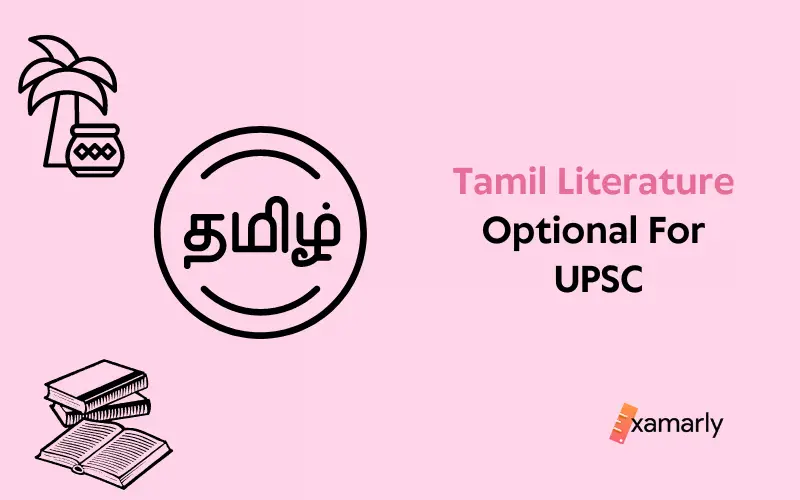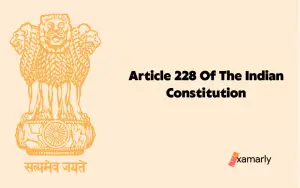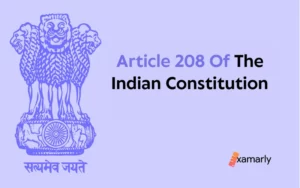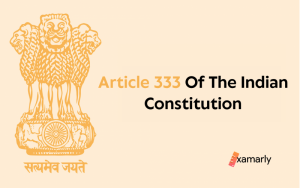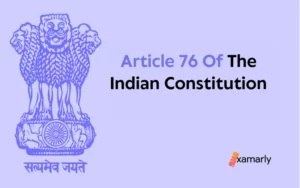Indians have been using Tamil for centuries. It is a member of the Dravidian family of languages and has an extensive and well-recorded history of literary works in the fields of poetry, prose, religion, modes of worship, and science. It is listed in the Indian Constitution’s eighth schedule and is acknowledged as one of the country’s official languages. It is used in Tamil Nadu, Andhra Pradesh, Telangana, portions of Kerala, and Karnataka. Tamil literature optional for UPSC quite comprehensive so it does not require frequent updates.
Students who want to choose a subject for the UPSC examination should choose a subject that they have studied before. A subject that is familiar to them will ensure they do not lose interest in it during the examination. Also, the subject should be relevant to the role of a civil servant in the country.
- Comparison/Similarity With Other Optional Papers
- Advantages Of Tamil Literature Optional For UPSC
- Mastering The Subject From Basics
- Importance Of Academic Background
- What Time Duration Is required For Preparation?
- Overlapping Syllabus With GS
- Disadvantages Of Tamil Literature Optional For UPSC
- Recent Toppers of UPSC CSE With Tamil Literature Optional
- Data/Scores Available
- Standard References
- Conclusion
- FAQs
Comparison/Similarity With Other Optional Papers
You won’t need to stay up to date on current events and recent advancements as compared to other subjects because Tamil Literature has a consistent and unchanged syllabus.
While there is resource material accessible for some electives, such as English literature, it might be challenging to get sufficient materials for Tamil literature-related topics.
Answers to Tamil literature papers are subjective as compared to other optional papers, and there is no interconnection between Tamil Literature and GS.
Advantages Of Tamil Literature Optional For UPSC
- Tamil literature has a smaller syllabus for the UPSC than many other subjects.
- You are not required to update frequently for this. The curriculum remains largely unchanged.
The literary optional don’t include any current events. - You can receive a perfect score in grammar.
- Since you must read a lot of stories, poetry, etc., your preparation may be easier if you enjoy Tamil literature.
- Compared to other topics like history, government, geography, etc., there is less rivalry.
Mastering The Subject From Basics
If you are planning to take up Tamil as an optional subject in the UPSC IAS examination, you have to be aware of the syllabus for the subject. The syllabus is very extensive, and it can be quite a challenge to prepare for it. While the main exam is considered the toughest part of the examination, the optional subjects play an equally significant role. Literature subjects have a high success rate.
A technique that follows events in reverse chronological order is usually simple and engaging for all newly eager Tamil literature readers. Start with the most recent items, then work your way backward to the oldest.
You can start Tamil literature by reading poems penned by Vairamuthu and Vaali. Try to understand the choice of words and comparisons and styles used.
Listen to the songs whose lyrics are penned by Kannadasan and Pattukottaiyar. They are the beginning stages of understanding Tamil literature.
Read poems written by the big four of “Marumalarchi Padalgal”: Subramania Bharathiar, Bharathidhasan, Namakkal Kavignar, Kavimani Desiyavinayagam Pillai. They are easy to understand.
Now start with works of the genre Barani, Ula, Thudhu, Pallu, etc. They are the middle level of learning literature.
Now start reading Seerapuranam, Kambaramayanam, Silapathigaram, Manimegalai, etc. As they are in the story format you may easily understand the style used. But it may take a huge load of time to complete them and understand them to a greater extent.
Finally start reading Purananuru, Agananuru, and Kalithogai which come under Padhinen Keelkanaku Noolgal! You will understand the real essence of Tamil literature and poetic beauty there. They are the best of the best.
Importance Of Academic Background
Candidates can score good marks in Tamil literature with a good strategy and an in-depth understanding of the subject. The choice of this optional subject should be based on your interest and passion. This subject is suitable for those who have a strong grasp of the language. Passionate interest in the subject is another key that will speed up preparation.
A good academic background can give you an edge in UPSC exams. Besides core subjects, students with an academic background in Tamil Literature have a higher chance of success. It is recommended that if you don’t have any background in Tamil, do not take up this optional.
What Time Duration Is required For Preparation?
When preparing for the UPSC examination, you should spend as much time as possible on your chosen optional subject. However, if you are not interested in any particular subject, it is better to choose another one. Moreover, you should select a subject you are familiar with.
The syllabus of Tamil literature for UPSC preparation is relatively small. It is important to make sure you know the basic grammar of Tamil. You can complete this course in as little as 4 months.
Overlapping Syllabus With GS
Tamil literature has a unique syllabus that focuses on writing in a literary style, which is not taught in the regular syllabus. There is no overlap with the General Studies paper, so the time you spend on it will be entirely dedicated to this subject. It is advisable to study the syllabus thoroughly.
Related – UPSC Tamil Syllabus 2022
Disadvantages Of Tamil Literature Optional For UPSC
- Your answers have to be unique for them to stand out.
- They are considered less scoring since a lot of things are subjective here.
- Generally, it is recommended that you take any of the literature optionals only if you have studied the subject in-depth during your graduation. This is because a lot of material has to be read during the preparation.
- There is a dearth of coaching available for these optional subjects.
- There is virtually no overlap with general studies if you take literature optionals.
- You must memorize ‘Sangam’ age songs, Thirukural, and many other things, so it is important to do frequent revisions.
Recent Toppers of UPSC CSE With Tamil Literature Optional
Here is the list of the recent toppers of the UPSC Civil Services who have taken Tamil Literature as their Optional Subject-
| Name | Year | Rank |
| Priyanga R A | 2020 | 181 |
| Murukanantam | 2019 | 119 |
| Ms. T. Chitra | 2018 | 296 |
Data/Scores Available
| Year | Candidates Appeared | Candidates Recommended | Success Rate |
| 2018 | 73 | 08 | 11.0 |
| 2017 | 107 | 05 | 4.7 |
| 2016 | 225 | 29 | 12.9 |
| 2015 | 750 | 00 | 10.7 |
Standard References
The list of reference books of Tamil Literature (Paper I & II) is listed below-
- Tamil mozhi varalaru – Su. Sakthivel
- Mozhi nool – Mu. Varadarasanar
- Mozhi varalaru – Mu. Varadarasanar
- Tamil ilakkiya varalaru – Mu. Varadarasanar
- Tamil ilakkiya varalaru – Thamizannal
- Tamil ilakkiya varalaru – Madhu Sa. Vimalanandam
- Oppilakkiya kotpaadu – Ka.Na.Kailasapathy
- Naatupura iyal aaivu – Su.Sakthivel
- Ulaga sevviyal mozhigalin varisaiyil tamil – V.C. Kulandaisamy
- Valluvar padaikkum vaiyathu sorkkam – V.C. Kulandaisamy
- Tamil mozhiyum varalarum – Devira
- Tamil thiranaaivum panpaadum – Devira
- Tamizhar valartha azhagu kalaigal – Mayilai seeni Vengadasamy
- Ithazhiyal – Su. Sakthivel
- Tholkappiar Kanda Samudaayam – Dr. Natesan
- Idhazhiyal kalai – Dr. Ma.Pa. Gurusamy
- Ilakkiya Marabu – Mu. Varadarasanar
- Sanga ilakkiyam: ilakkiya valamum vazhviyal aramum – Dr. R. Chandrasekaran
- Tamilaga naatupuraviyal – Dr. Sargunavathy
- Silappathikara Thiranaaivu – Dr. Ma.Po.Sivagnanam
- Silappathigara urai – Gna. Manickavasagan
- Kurunthogai – Puliyur Kesikan urai
- Thirukkural – Parimelazhagar urai
- Kumbakaruna vadhai padalam – Dr. Durai Rasaram Urai
- Vanakkam valluva – Erode Tamilanban
- Thiruppavai – C.Subramanian
- Kambar kaatum Kumbakarnan – Arunagiri
- Thiruvasagam – A. S. Gnanasambandan
- Mozhi iyal – Dr. R. Srinivasan
- Tamil ilakkiya varalaru – C. Balasubramanian
- Tamil ilakkiya varalaru – Muthamizh Selvan
- Puthiya nokkil tamil ilakkiya varalaru – Tamilanban
- Tamilar Nagarigamum Panpaadum – Thatchinamoorthy
- Tamilar varalarum panpadum – K.K. Pillai
- Tamil Kaadhal – V. Subamanickam
- Thambiyar iruvar – A. S. Gnanasambandan
- Silambo silambu – Arasan Santhuvanar
- Silapathikaram Tamizhagam – Sami Chidambaranar
- Folk Literature – Muthuppattan Kathai
- Devotional Literature – Tiruvasagam: Neetthal Vinnappam
- Thazhntha Tamilagame
- Devotional Literature – Bharathidasan: Kudumba Vilakku.
Conclusion
Recent trends indicate that, the success rate of literature subjects as compared to other optional subjects. Tamil Literature is one of the literature subjects offered by the UPSC IAS Mains Exam. The syllabus for UPSC Tamil Literature is fairly static and short, so preparation for this subject will be comparatively lighter than for other subjects. It does not include current affairs, but does require reading several stories and poems, and contains some grammar. It is also less difficult to pass than other English and Hindi Optional Papers.
You Might Also Like – Gujarati Literature Optional For UPSC
FAQs
Q. Does Tamil literature make a good UPSC optional?
In the civil services main exam, the UPSC IAS Exam offers Tamil literature as one of the optional subjects. IAS candidates often choose literature as one of their electives. Furthermore, it has a decently high success rate.
Q. Can I take the UPSC examination in Tamil?
Any language listed in the Indian Constitution may be used to write UPSC exams.
Q. Can the optional UPSC Tamil syllabus be completed in three months?
Yes, it is possible to finish the UPSC Tamil Optional Syllabus in three months. To prepare for this, the applicant should begin reading the books that are required by the syllabus and then compare them to the PYQs. This gives a good indication of the subjects covered. More emphasis and practice should be placed on frequently asked questions. A dedicated timetable can readily assist in covering the Tamil Literature Optional UPSC Syllabus in three months because it is static and not as extensive as other optional.


